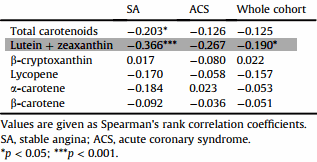Results 1 to 1 of 1
-
08-23-2017, 12:21 PM #1Chemistry Experiment












- Join Date
- Feb 2009
- Location
- anabolicmuscleforums.com
- Posts
- 6,249
- Rep Power
- 2147876
 Lutein helps prevent hardening of the arteries by inhibiting inflammatory factors
Lutein helps prevent hardening of the arteries by inhibiting inflammatory factors
Lutein helps prevent hardening of the arteries by inhibiting inflammatory factors
Lutein is a fascinating substance found in curly kale, which might speed up fat loss, make physical exercise less unpleasant and reduce the chance of developing prostate cancer. The same lutein probably also protects against hardening of the arteries, Swedish researchers at the University of Link÷ping discovered.
Lutein & atherosclerosis
Vascular diseases are partly a consequence of chronic and low-grade inflammation processes. These processes play a role in the hardening of arteries or atherosclerosis. There are indications that lutein, a compound related to betacarotene found mainly in kale but also in spinach and broccoli, can help prevent atherosclerosis.
Animal studies have shown that lutein reduces hardening of the arteries. [Circulation. 2001 Jun 19;103(24):2922-7.] [J Nutr. 2011 Aug;141(8):1458-63.]Epidemiological research suggests that a high concentration of lutein and related substances such as zeaxanthin, beta-cryptoxanthin and alpha-carotene can slow down the progression of atherosclerosis. [Arterioscler Thromb Vasc Biol. 2004 Feb;24(2):313-9.] [Arterioscler Thromb Vasc Biol. 1997 Jun;17(6):1171-7.]

Study
The researchers wondered whether the positive effects of lutein are due to the inhibition of inflammatory proteins such as interleukin 6 and TNF-alpha. To find out more they studied 193 people with a vascular disease. Most of them had angina.Results
The more lutein there was in the participants' blood, the less interleukin-6 there was circulating in their system.
In the table below the researchers have added up the values for lutein and zeaxanthin, as the two substances are difficult to distinguish from each other. Because foods that contain lutein also provide zeaxanthin, these two substances are often found in a particular ratio (about 5:1) in human blood.

The researchers extracted immune cells from the participants' blood and exposed them to lutein. The higher the concentration of lutein, the less interleukin-6, interleukin-1-beta and TNF-alpha the cells produced.

Conclusion
"Our data indicate that lutein by itself has the potential to exert significant anti-inflammatory effects in patients with coronary artery disease, thus revealing one mechanism by which lutein can contribute to atheroprotection," the researchers wrote.
"Future dietary intervention studies are warranted to confirm whether increasing the consumption of lutein has beneficial effects on clinical outcomes in patients with coronary artery disease."
Source:
Atherosclerosis. 2017 Jul;262:87-93.
All posts are for entertainment and may contain fiction. Consult a doctor before using any medications. heavyiron does not advocate readers engage in any illegal activity.





 Reply With Quote
Reply With Quote









Bookmarks